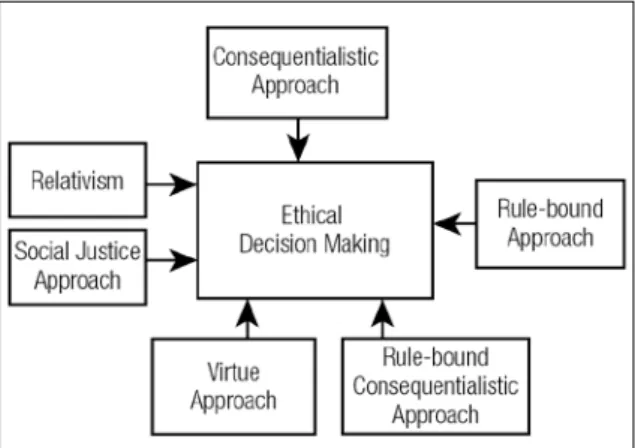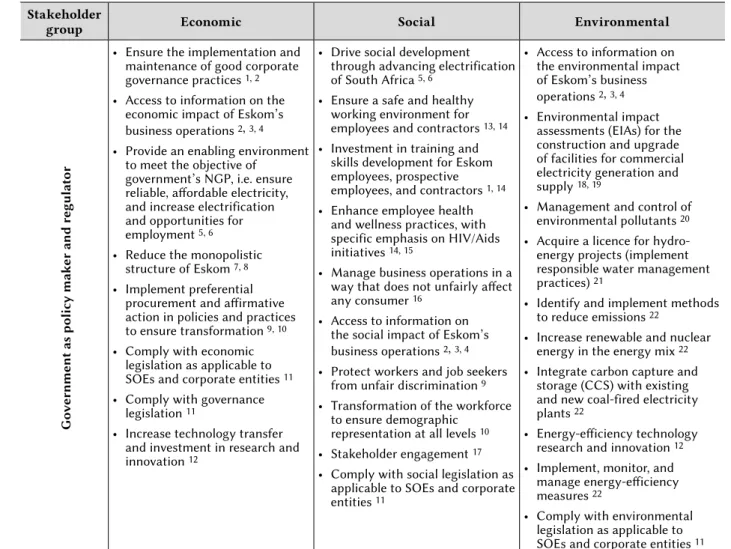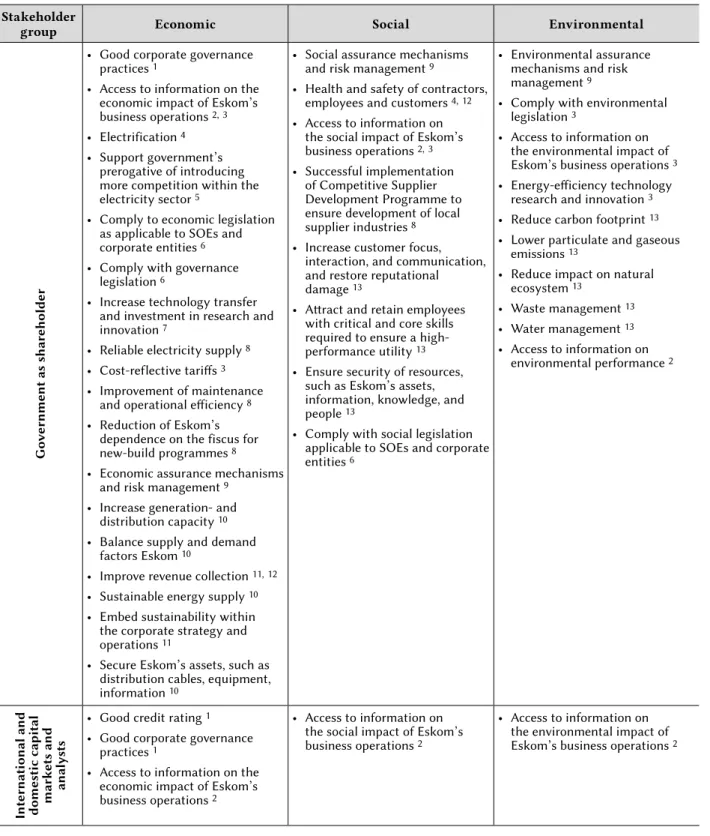The role of self-leadership in becoming an ethical leader in the South African work context 7. The role of self-leadership in becoming an ethical leader in the South African work context 9.
The development and initial validation of the work convictions questionnaire
The development of the Workplace Beliefs Questionnaire (WCQ) was based on the holistic framework of approaches that influence ethical decision-making. The CFA results for each of the six decision-making approaches are presented in Table 2.

Corporate governance, integrated reporting, and stakeholder
A case study of Eskom
However, no systematic research has focused on the disclosure of Eskom's stakeholder management through its integrated reporting. First, Eskom's stakeholders were identified, grouped, classified and mapped, after which the TBL interests and expectations of these interest groups were categorized.

Eskom
The government as policy maker and regulator and NERSA as regulator work within Eskom's contextual environment. The TBL interests and expectations of these respective interest groups within Eskom's contextual environment are summarized in Table 2. This section assesses the disclosure of stakeholder management at the transactional level in Eskom's 2012 integrated report, more specifically whether the report the.
The authors used the TBL interests and expectations identified at the rational level (RQ2) to code the Eskom 2012 integrated report. The Eskom 2012 integrated report addressed most of the TBL identified interests and expectations of its stakeholder groups - in different degrees and based on different aspects of discovery. The objective of this study was to assess Eskom's stakeholder management performance by assessing the extent of disclosure in its 2012 integrated report.
The authors concluded that Eskom's 2012 integrated report did not provide a detailed overview of stakeholder management at a rational level. The authors identified and mapped 13 stakeholder groups, while Eskom's 2012 integrated report identified only seven. The report did reveal some of the challenges in achieving the TBL interests and expectations identified by the authors, but focused on challenges per operational unit within Eskom's value chain.

Evaluating normative justifications for affirmative action as racial redress
In other words, affirmative action refers to state interference in the employment practices of companies motivated by the need to reduce inequality and more equitable representation in the workplace. It may seem strange to look for a normative rationale for affirmative action in the work of Robert Nozick. However, this does not seem to mean that redistribution in the South African context is necessarily morally illegitimate.
According to this principle, historical injustices in the acquisition and transfer of ownership shares must be corrected. This may provide a rationale for group-based affirmative action in the South African context, as opposed to individual restitution, but paradoxically only if affirmative action can be justified by Rawlsian principles (an issue we will return to next time). Rawls therefore argues that we should choose the principles of justice in the initial position, as it is “the appropriate initial status quo and thus is “an initial situation that is just” (1999:11).
10 The question of the Rawlsian account of affirmative action is not extensively discussed in the existing literature. Attempting to establish a Rawlsian justification for categories 4 and 5 forms of affirmative action therefore runs into the same problem we encountered when applying Nozick's principle of correction to the South African situation – we do not have sufficient knowledge of what the (just) distributional situation would be if we did not there was historical injustice (in other words, if due process had been followed). Similarly, South Africa's Employment Equality Act (1998:1) also cites diversity as one of the justifications for the Act, stating in its preamble that affirmative action is necessary "to achieve a diverse workforce that broadly represents our people". .
Why the world is still unequal
On the apparatuses of justification and interpassivity
We can act as if we believe 'the system' works because others believe on our behalf. Inequality, on the other hand, refers to "the gap between those with low and high incomes" (Taylor, 2012:98). Of this there is metaphysical evidence, as the Divine himself proclaimed "the poor will always be with us".
Freedom of enterprise, considered independently, is not freedom at all, but "the freedom to work or starve" (Marcuse, 1968:2). Two forms of loss can be added to this: the loss of individualism and the loss of democratic solidarity. While Skidelsky and Sandel emphasize the loss of "the good life" in their respective writings, their articulations of the good life inevitably contain elements of the individualism that Wilde champions.
Therefore, the price of inequality is individualism, at both ends of the scale of inequality – the poor do not have the luxury (time, resources or solitude) to develop individuality; the rich, on the other hand, are very busy. For example, instead of assuming gluttony, we can assume a point of material comfort that is sufficient to achieve the "good life." This is because ethics itself is a form of (phenomenological) inequality – an asymmetrical relationship (with the 'other') that is infinite.
South African mining sector
Fraud and controversial deals This was the second-largest mentioned category
It involved practices contrary to the spirit of the B-BBEE Act, including the way in which BEE deals are structured and financed (which also constitutes a legal offence), benefiting foreigners or non-HDSAs through BEE deals, exclusion or disadvantage community in setting up BEE initiatives contrary to expectations in BEE policy and questionable shareholder structure. Commenting on BEE deals negotiated with non-HDSAs, Haffajee (2010:21) highlights two power-building deals that “represent the arrival of predatory post-colonial capitalism on our shores, where political dynasties reap profits from developing economies, little they invest and take profits abroad. Sergeant (2010:18) raises the issue of the rapid time between when a BEE partner acquires shares in a company and when those shares are sold at a profit: “Where deals have succeeded, BEE participants have often been sold quickly.
Mismanagement and negligence
Only those breaches of corporate governance in the mining sector relating to BEE agreements reported in the South African English press during the period under review were recorded. Other unreported incidents of corporate governance violations may have existed outside of these media reports, and media reports may also have had reporting biases. Human error may have been present in the qualitative judgment related to the identification of reported violations of corporate governance.
The results were dominated by mentions of corporate governance violations related to a few large companies, which do not necessarily reflect management within the sector as a whole. However, the media has been shown to highlight issues that might otherwise remain hidden (Bednar, 2012), and despite these limitations, the study provides an indication of the broad categories of corporate governance violations that are of public interest. The purpose of the survey was to identify broad areas of reported corporate governance violations in the mining sector to highlight.
Contextualizing the reported breaches of corporate governance against this framework provides some direction for a focus of intervention by both government and boards. At the heart of the problem, whether formally labeled corporate governance violations or not, are practices that ultimately affect sound governance in this sector. The application of the third King Report on Corporate Governance to small and medium enterprises.
Porportionalist reasoning in business ethics
To make sense of the codes of conduct, business leaders draw on the expertise of the philosophical community. This amounts to a critique of the entire commercial culture that characterizes modernity, as is clear from Zaborowski's (2010) book-length account of Spaemann (subtitled Nature, freedom and critique of modernity). The agent (soldier, business manager) may foresee that his action will lead to the other person's death (in the case of the soldier) or job loss (in the case of the manager), but does not directly intend this; rather, he intends a just victory (and a peaceful, reconciled society or society of societies), or else the continued health of the enterprise.
This argues against this approach, but I argue that it does not preclude a critical appropriation of the Aristotelian framework. Due to the moral identity of the individual, the means used are important from the perspective of the subject concerned with his or her integrity. What defines an activity as a social practice (rather than just doing something in general) is that the means used to achieve success in the practice are partly definitive (rather than tangential) to the participant's successful implementation of the practice: they are internal goods of practice.
This produces the content of the goal by which the proportionality of the means taken is assessed. Such values are systematically disregarded because of the extra-ethical definition of the purpose of business ventures. Indeed, the character of the business manager—the quality of his or her participation in the moral community—does matter, and character is formed by acts of deliberate prudence.
Book review
It takes the common good of the company and its contribution to the common good of society as the key orientation of business management and leadership” (Melé italics in the original text). The book's central theme is the integration of ethics and management, and the main idea that Prof. A typical example of the approach found throughout the book is the discussion it offers of the holistic approach to decision-making in management, by considering four basic dimensions when analyzing alternative trading options.
Of great value to the practitioner is also a table of four pages in which the author summarizes the main responsibilities of the firm towards the main stakeholders (Melé. When evaluating such lists, one must look at the justification behind them, and at the quality of the insights they offer. An aspect of the book worth highlighting is the fundamental role in business ethics it assigns to intelligent love and, closely related to it, friendship-based reciprocity.
It is perhaps worth noting that this is only one of several points in the book in which one can discern the important foundational role that key Aristotelian concepts play in the thought of the author. However, in the context of the entire book, it seems to me merely to talk about these points. In conclusion, after carefully reading this work, it is my considered judgment that the effusive endorsements by several leading scholars and practitioners of management and business ethics, which one finds on the back cover of the book, are fully justified.




![Figure 1: Eskom’s stakeholder map. [Source: Authors’ own]](https://thumb-ap.123doks.com/thumbv2/pubpdfnet/10321271.0/39.871.216.676.136.575/figure-eskom-s-stakeholder-map-source-authors-own.webp)
![Figure 2: Legislative and policy instruments affecting Eskom and its stakeholders. [Source: Authors’ own]](https://thumb-ap.123doks.com/thumbv2/pubpdfnet/10321271.0/40.871.115.753.612.1069/figure-legislative-policy-instruments-affecting-stakeholders-source-authors.webp)
